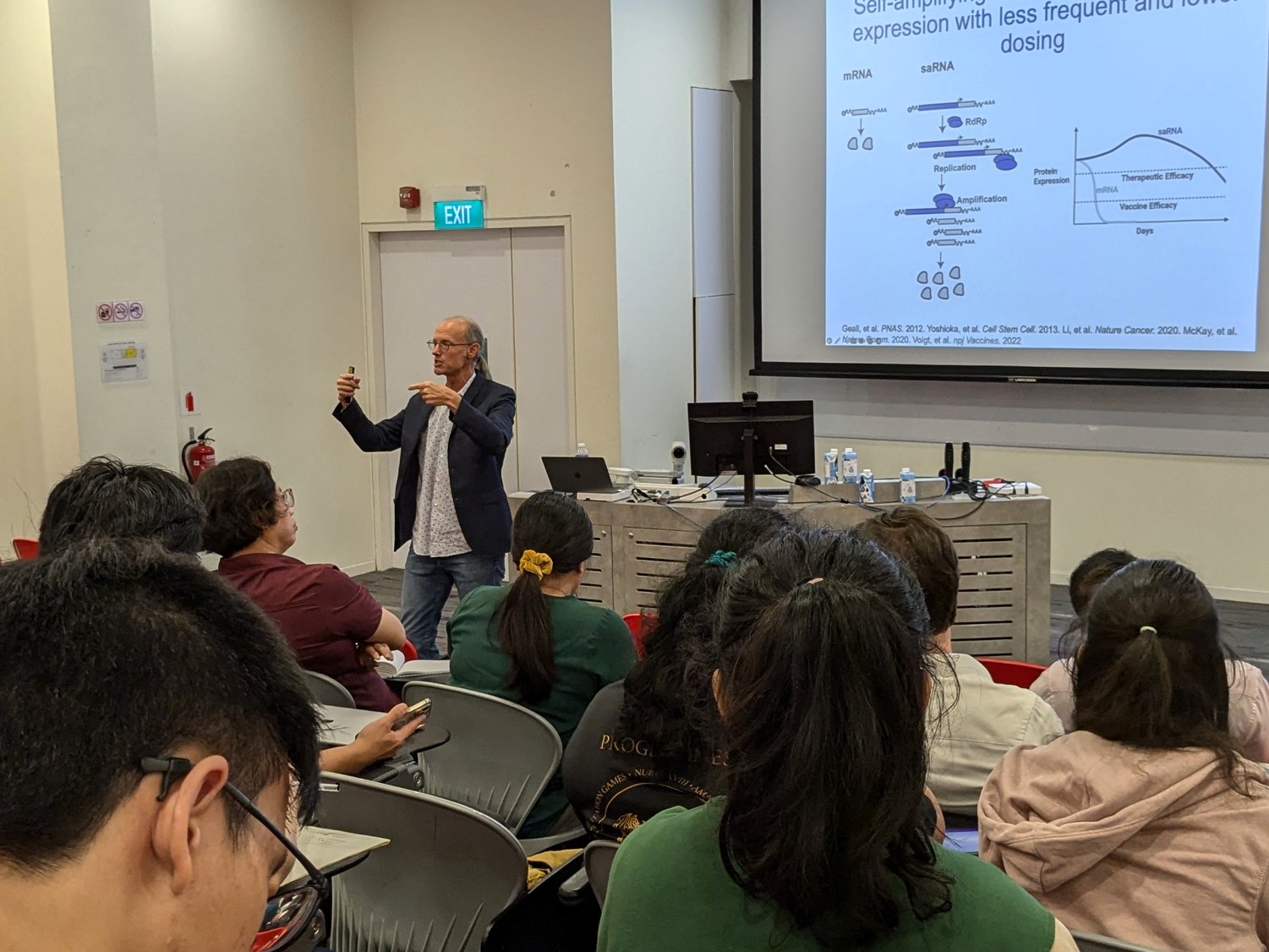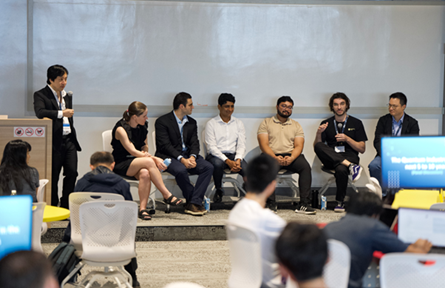Clinically Informed Natural and Synthetic Polymers: From Modified Self-amplifying RNA for Ultra-low Dose Vaccines to Polymeric Hydrogels for Wound Management by Prof Mark Grinstaff
IAS STEM Graduate Colloquium Jointly Organised with the Graduate Students’ Clubs
The IAS, CCEB and the Graduate Students’ Clubs of CCEB and SBS jointly organised the STEM Graduate Colloquium featuring our distinguished speaker, Prof Mark Grinstaff on 8 July 2024 at LT7.
He is the William Fairfield Warren Distinguished Professor, and a Professor of Chemistry, Biomedical Engineering, and Medicine at Boston University. He is a co-founder of several companies and his innovative ideas have led to one new FDA approved pharmaceutical (AbraxaneTM) and four medical device products (OcuSeal® and Adherus Surgical Sealants®) that are now the standard of care. His current research activities involve the synthesis of new natural and synthetic macromolecules and biomaterials, self-assembly chemistry, imaging contrast agents, drug delivery, and wound repair.
Prof Grinstaff delivered an insightful colloquium that delved into the groundbreaking research at the intersection of chemistry, biomedical engineering, and clinical application, mainly structured on seminal advancements in three projects, each poised to revolutionise contemporary medical practice.
 Prof Grinstaff meticulously describing the development of saRNA.
Prof Grinstaff meticulously describing the development of saRNA.
Prof Grinstaff commenced his lecture by discussing the development of self-amplifying RNA (saRNA) for ultra-low dose vaccines. His innovative approach was to substitute novel modified nucleotides in the saRNA which led to long lasting protein expression and reduced the cell’s immune response against the foreign RNA. Such an advancement holds profound implications for vaccine distribution logistics, cost reduction, and mitigation of side effects, particularly in the context of global health emergencies where rapid and scalable vaccine production is paramount.
Transitioning to the second focal point of his presentation, Prof Grinstaff illuminated the development of hydrogels based on crosslinked dendrimers designed to function as adhesives for eye wounds during surgery or injury. These hydrogels are engineered to seal the wounds while withstanding high interocular pressure, and ensuring biocompatibility, The traditional sutures used to repair the wounds inflict trauma to the sensitive corneal tissue and might cause infection at the repaired site. The hydrogel’s adhesive properties render them exceptionally suited for sealing wounds on the ocular surface, promoting healing and obviating the necessity for traditional sutures. This breakthrough could significantly enhance the management of ocular injuries, offering a safer and more efficacious alternative to current therapeutic modalities.
The final segment of Prof Grinstaff's seminar was devoted to discussing the strategies for imaging and treatment of osteoarthritis, a degenerative joint disease. He elucidated how large molecular weight polyanions can be used as biolubricants which emulate the natural lubricants present in cartilage, thereby reducing friction and wear within joints afflicted by osteoarthritis. Administered via intra-articular injection, these biolubricants overcome the shortcomings of the traditional hyaluronic acid based viscosupplements and provide sustained lubrication and pain relief, potentially enhancing joint function and arresting the progression of the disease. This novel therapeutic approach can potentially improve the quality of life for patients suffering from osteoarthritis, addressing a significant unmet medical need.
Prof Grinstaff's seminar showcased the potential of clinically informed natural and synthetic polymers in addressing some of the most pressing challenges in modern medicine. His pioneering work on self-amplifying RNA, ocular hydrogels, and cartilage lubricants exemplifies the transformative power of interdisciplinary research. It inspired the audience with the possibilities these innovations hold for improving healthcare outcomes.

Written by Parth Patankar | NTU School of Chemistry, Chemical Engineering and Biotechnology Graduate Students' Club
"I liked how Prof Grinstaff explained initially daunting concepts as if it were a simple conversation. As an undergraduate with little knowledge, I was initially panicking, yet he explained his work in a way that allowed me to learn a lot." - Deboleena Roy (undergraduate, CCEB)
"Very good delivery of interesting projects, even people without prior knowledge (like me) understood the gist of it." - Yang Mingke (PhD student, EEE)
"This was my very first time attending a colloquium at NTU. I had a blast and learned many things from Prof Mark—his life's work, the theoretical knowledge involved, and his impressive presentation skills" - Darren Ho Kai Jun (undergraduate, SBS)















/enri-thumbnails/careeropportunities1f0caf1c-a12d-479c-be7c-3c04e085c617.tmb-mega-menu.jpg?Culture=en&sfvrsn=d7261e3b_1)

/cradle-thumbnails/research-capabilities1516d0ba63aa44f0b4ee77a8c05263b2.tmb-mega-menu.jpg?Culture=en&sfvrsn=1bc94f8_1)






